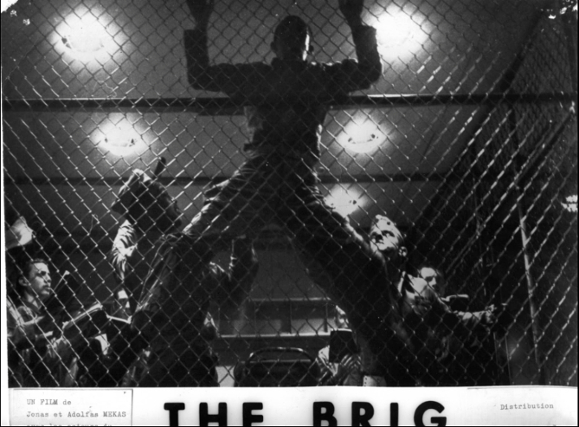Having moved to New York as a refugee in 1949, after being interred in a forced labor camp in Nazi Germany, Mekas has had an incomparable impact within the arenas of film and art, both through his experimental, largely diaristic films, and as co-founder of Film Culture magazine, The Film-makers’ Cooperative and Anthology Film Archives. His role as both organizer and filmmaker can be seen as one of unflinching lived activism.
Seen together, the films Jonas in the Brig and The Brig manifest a series of triangulations between the artist protagonists – Mekas, the actors of The Living Theatre, and de Hirsch – circulating around forms of theatrical realism, filmic document, and experimental reportage. The films raise questions as to the positions and limits between the document and the chronicle, experimentalism and anti-war activism, diary and art, radically redefining the space of theater.
The play The Brig was first performed by The Living Theatre on May 13, 1963. Written by former US marine Kenneth H. Brown, it draws from Brown's own experience of being held in military prison for thirty days, for being absent without leave while serving in Japan in the 1950s. The Living Theatre's performance embodied the daily routines and degrading rituals of prisoners and guards – in Mekas’s words it was "so precisely acted that it moved with the inevitability of life itself ... it was a real brig, as far as I was concerned." Mekas witnessed the last public performance of the play, undertaken in direct resistance to attempts by the IRS to shut down The Living Theatre's location on 14th Street, that led to many audience and theater members being arrested. Possessed by the idea of documenting The Brig on film – what he saw as equivalent to a news reporter gaining access to a real Marine Corps prison – Mekas instigated a further defiant performance of the play at a temporary location on 42nd Street, the actors performing for the camera over the course of one night. The resulting film, an act of civil disobedience, restricts even further any awareness in the viewer that what is being documented is anything other than the real brutalities and humiliations of military life. The footage is tightly contained and claustrophobic, a precise reconstruction in cinematic terms of the experience of being in the play.
Present also at the filming of The Brig was poet, filmmaker, and founding member of The Film-makers' Cooperative Storm de Hirsch, and while her partner Louis Brigante assisted Mekas with the production, she shot her own short newsreel footage. Newsreel: Jonas in the Brig distinctly departs from Mekas's approach however, with Hirsch turning the camera on Mekas himself, an experimental study of the process of filming the play that succinctly captures the tension of the performance's wider context, and the anarchist, anti-authoritarian ethos behind The Living Theatre.
The screenings will be followed by an open discussion with Mekas involving contributions from figures engaged with activism in theater, writing, art and cinema. Audience members are encouraged to join in the conversation, and share their own perspectives on the intersection of these practices.
